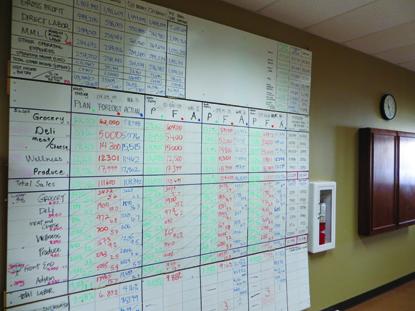Bringing Open Book Management to Life at Just Food Co-op

Justice and Just Food Co-op in Northfield, Minn., opened its doors in 2004. Once the co-op had successfully navigated the initial challenges that every startup faces and began to experience stable finances and sales growth, management felt it was time to engage the staff in the continued success of the business. A training session during a National Cooperative Grocers Association meeting provided the impetus to roll out Open Book Management (OBM) in the fall of 2011.
Two things that happened during the training session strongly impacted the decision to bring OBM to life at Just Food. First, a diverse group of general managers came together around a shared vision and shared goals, in a matter of hours; and second, they were all having FUN! People were laughing and engaging and learning together. It felt like exactly what Just Food needed at the time.
Education
When implementation began, teaching the co-op’s 50 staff members about key financial indicators and how their work impacts the financial condition of the business was one of the key success factors. Management went beyond just posting sales figures on the wall or showing labor numbers on the schedule. Instead, they designed work sessions where staff members were invited to walk through the income statement and balance sheet and ask questions about what they saw. The financial manager played a vital role in literally “opening the books” to staff members and encouraging them to question the numbers.
Rewards
Incorporating one or more financial “games” alongside the educational component is another important aspect of OBM. Providing an opportunity for staff members to earn bonus money by meeting certain goals creates a powerful incentive and helps to gain and keep employee engagement. Since margin and
labor are key controllable expenses, at Just Food they made a game of the margin-minus-labor (MML) equation. Put simply, if the MML figure is better than was budgeted, bonus money is paid out to staff. Additionally, -management found that OBM breathed new
life into the traditional profit-sharing structure that was in place but had rarely paid out.
Fun!
At Just Food, the numbers come to life at the weekly Open Book meeting (called the “Swarm”), where all staff members are invited to check in on progress and share ideas. The “story” of the previous week is told, figures are posted, and forecasts are created for the coming week. Announcements are made, news is shared, recognition is offered, and everyone leaves feeling well-informed, energized, and ready for another successful week.
In the early days, various methods were employed to create energy and excitement at the meetings. People wore costumes, toys and snacks were distributed, and people yelled and cheered and hugged each other and, in general, acted a little crazy. It was awesome, and people wanted to come to the meeting and talk about the numbers! How great is that?
Just Food General Manager Patrick Neily points out the impact of staff taking ownership of the program. He says, “As a manager, there’s nothing better to me than staff engaging each other in the numbers and telling the story behind them, leading discussions and giving feedback.” Throughout the implementation process and evolution of the program, a cornerstone has been the belief that if staff are invested and engaged in the process, they’ll be better able to understand and meet store financial goals. Right from the start, management at Just Food encouraged grocery stockers and cashiers to take ownership of the lines on the big board and negotiated scheduling conflicts to get as many people as possible to attend. Now, two years into OBM, Patrick says that 25–35 percent of staff attend the meeting each week.
Implementing an Open Book program takes a lot of time, energy, and hard work. It doesn’t happen overnight. However, the rewards can be BIG! There is power in transparency. When staff members are informed and participate in improving the financial success of the co-op, there are countless benefits: more employee satisfaction, great ideas being implemented, better customer service, and improved financial results. Neily says it best: “Knowing that one-third of your staff are all moving in the same direction and are all more informed each week—absolutely priceless.”







